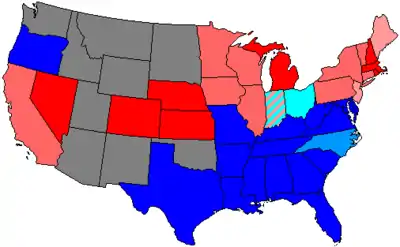46th United States Congress
The 46th United States Congress was a meeting of the legislative branch of the United States federal government, consisting of the United States Senate and the United States House of Representatives. It met in Washington, D.C. from March 4, 1879, to March 4, 1881, during the last two years of Rutherford Hayes's presidency.
| 46th United States Congress | |
|---|---|
45th ← → 47th | |
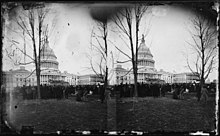 United States Capitol (1877) | |
March 4, 1879 – March 4, 1881 | |
| Members | 76 senators 293 representatives 8 non-voting delegates |
| Senate Majority | Democratic |
| Senate President | William A. Wheeler (R) |
| House Majority | Democratic (coalition) |
| House Speaker | Samuel J. Randall (D) |
| Sessions | |
| 1st: March 18, 1879 – July 1, 1879 2nd: December 1, 1879 – June 16, 1880 3rd: December 6, 1880 – March 3, 1881 | |
The apportionment of seats in this House of Representatives was based on the Ninth Census of the United States in 1870. The Senate had a Democratic majority, while the House of Representatives had a Democratic plurality. The Democrats were still able to control the House, however, with the help of the Independent politicians who caucused with them.
Party summary
Senate
| Party (shading shows control) |
Total | Vacant | |||||
|---|---|---|---|---|---|---|---|
| Anti- Monopoly (AM) |
Democratic (D) | Republican (R) | Independent (I) | Other | |||
| End of previous congress | 1 | 36 | 38 | 1 | 0 | 76 | 0 |
| Begin | 1 | 42 | 31 | 1 | 0 | 75 | 1 |
| End | |||||||
| Final voting share | 1.3% | 56.0% | 41.3% | 1.3% | 0.0% | ||
| Beginning of next congress | 0 | 37 | 36 | 1 | 1[lower-alpha 1] | 75 | 1 |
House of Representatives
| Party (shading shows control) |
Total | Vacant | |||||
|---|---|---|---|---|---|---|---|
| Democratic (D) |
Independent Democratic (ID) | Independent (I) | Greenback (G) | Republican (R) | |||
| End of previous congress | 154 | 1 | 0 | 0 | 136 | 291 | 2 |
| Begin | 141 | 6 | 0 | 13 | 131 | 291 | 2 |
| End | 143 | 129 | |||||
| Final voting share | 49.1% | 2.1% | 0.0% | 4.5% | 44.3% | ||
| Beginning of next congress | 128 | 1 | 1 | 10 | 151 | 291 | 0 |
Leadership
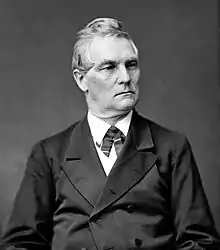
William A. Wheeler
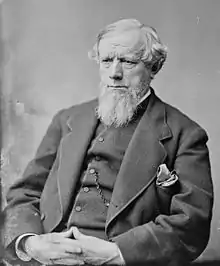
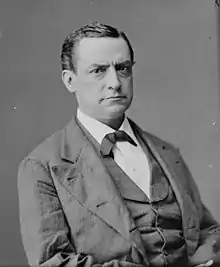
Senate
House of Representatives
Major events
- Depression of 1873–79
- March 18, 1879: Samuel J. Randall was elected in one of the most tightly fought contests for the speakership after the Civil War. Randall, who favored the protective tariff and "hard money," drew his greatest strength from northern cities and greatest opposition from the west and south. The midterm elections of 1878 had gone badly for the Democrats, with the Greenback Party making inroads in key districts. This emboldened Randall's opponents, who rallied to the support of Joseph Blackburn from Kentucky. In the end, Randall prevailed in the Democratic caucus to receive the nomination, with 75 votes to Blackburn's 57 and a scattering of 9 votes to three other candidates. Blackburn, in moving to make Randall's nomination unanimous, steered his supporters away from the nomination of Hendrick B. Wright, a Democrat from Pennsylvania who was nominated by the Greenbacks. In the eventual vote in the House to elect the Speaker, Randall prevailed with 144 votes, to 125 for James Garfield (Republican from Ohio), 13 for Wright, and one for William "Pig Iron" Kelley (Pennsylvania).
- November 2, 1880: U.S. presidential election, 1880: James Garfield (R) defeated Winfield S. Hancock (D)
- February 19, 1881: Kansas became the first state to prohibit alcohol.
Major legislation
- [data unknown/missing]
Members
This list is arranged by chamber, then by state. Senators are listed by class, and Representatives are listed by district.
Senate
Preceding the names in the list below are Senate class numbers, which indicate the cycle of their election. In this Congress, Class 1 meant their term ended with this Congress, requiring re-election in 1880; Class 2 meant their term began in the last Congress, requiring re-election in 1882; and Class 3 meant their term began in this Congress, requiring re-election in 1884.
Alabama
Arkansas
California
Colorado
Connecticut
Delaware
Florida
Georgia
Illinois
Indiana
Iowa
Kansas
Kentucky
Louisiana
Maine
Maryland
Massachusetts
Michigan
Minnesota
|
Mississippi
Missouri
Nebraska
Nevada
New Hampshire
New Jersey
New York
North Carolina
Ohio
Oregon
Pennsylvania
Rhode Island
South Carolina
Tennessee
Texas
Vermont
Virginia
West Virginia
Wisconsin
|
House of Representatives
The names of members are preceded by their district numbers.
Changes in membership
The count below reflects changes from the beginning of the first session of this Congress.
Senate
- Replacements: 4
- Democratic: no net change
- Republican: no net change
- Deaths: 3
- Resignations: 1
- Interim appointments: 2
- Total seats with changes: 5
| State (class) |
Vacator | Reason for change | Successor | Date of successor's formal installation[lower-alpha 2] |
|---|---|---|---|---|
| New Hampshire (3) | Vacant | Legislature had failed to elect. An interim successor was appointed March 13, 1879. |
Charles H. Bell (R) | March 13, 1879 |
| New Hampshire (3) | Charles H. Bell (R) | Successor elected June 18, 1879, but did not begin service until June 20, 1879, for unknown reasons. | Henry W. Blair (R) | June 20, 1879 |
| Michigan (1) | Zachariah Chandler (R) | Died November 1, 1879. Successor appointed November 17, 1879, to continue the term. Appointee was elected January 19, 1881, to finish the term. |
Henry P. Baldwin (R) | November 17, 1879 |
| Alabama (3) | George S. Houston (D) | Died December 31, 1879. Successor appointed January 7, 1880, to continue the term. |
Luke Pryor (D) | January 7, 1880 |
| Georgia (3) | John B. Gordon (D) | Resigned May 26, 1880, to promote building of the Georgia Pacific Railway. Successor elected May 26, 1880. |
Joseph E. Brown (D) | May 26, 1880 |
| Alabama (3) | Luke Pryor (D) | Successor elected November 23, 1880. | James L. Pugh (D) | November 24, 1880 |
| Wisconsin (3) | Matthew H. Carpenter (R) | Died February 24, 1881. | Vacant | Not filled this term |
House of Representatives
- Replacements: 8
- Democratic: 1 seat net gain
- Republican: 1 seat net loss
- Deaths: 4
- Resignations: 3
- Contested election: 2
- Total seats with changes: 11
| District | Vacator | Reason for change | Successor | Date of successor's formal installation[lower-alpha 2] |
|---|---|---|---|---|
| Texas 6 | Vacant | Rep. Gustav Schleicher died during previous congress | Christopher C. Upson (D) | April 15, 1879 |
| New York 12 | Vacant | Rep.-elect Alexander Smith died during previous congress | Waldo Hutchins (D) | November 4, 1879 |
| Iowa 5 | Rush Clark (R) | Died April 29, 1879 | William G. Thompson (R) | October 14, 1879 |
| Missouri 7 | Alfred M. Lay (D) | Died December 8, 1879 | John F. Philips (D) | January 10, 1880 |
| New York 32 | Ray V. Pierce (R) | Resigned September 18, 1880 | Jonathan Scoville (D) | November 12, 1880 |
| Alabama 6 | Burwell B. Lewis (D) | Resigned October 1, 1880, to accept presidency of the University of Alabama | Newton N. Clements (D) | December 8, 1880 |
| Ohio 19 | James A. Garfield (R) | Resigned November 8, 1880 | Ezra B. Taylor (R) | December 13, 1880 |
| New Hampshire 3 | Evarts W. Farr (R) | Died November 30, 1880. Successor elected December 28, 1880. |
Ossian Ray (R) | January 8, 1881 |
| Florida 2 | Noble A. Hull (D) | Lost contested election January 22, 1881 | Horatio Bisbee, Jr. (R) | January 22, 1881 |
| North Carolina 1 | Joseph J. Martin (R) | Lost contested election January 29, 1881 | Jesse J. Yeates (D) | January 29, 1881 |
| New York 9 | Fernando Wood (D) | Died February 14, 1881 | Vacant | Not filled this term |
| Michigan 7 | Omar D. Conger (R) | Resigned March 3, 1881, after being elected to the US Senate | Vacant | Not filled this term |
Committees
Lists of committees and their party leaders, for members (House and Senate) of the committees and their assignments, go into the Official Congressional Directory at the bottom of the article and click on the link (3 links), in the directory after the pages of terms of service, you will see the committees of the Senate, House (Standing with Subcommittees, Select and Special) and Joint and after the committee pages, you will see the House/Senate committee assignments in the directory, on the committees section of the House and Senate in the Official Congressional Directory, the committee's members on the first row on the left side shows the chairman of the committee and on the right side shows the ranking member of the committee.
Senate
- Additional Accommodations for the Library of Congress (Select)
- Agriculture (Chairman: John W. Johnston; Ranking Member: Algernon S. Paddock)
- Appropriations (Chairman: Henry G. Davis; Ranking Member: William Windom)
- Audit and Control the Contingent Expenses of the Senate (Chairman: Benjamin H. Hill; Ranking Member: John P. Jones)
- Cabinet Officers on the Floor of the Senate (Select)
- Civil Service and Retrenchment (Chairman: Matthew C. Butler; Ranking Member: Henry M. Teller)
- Claims (Chairman: Francis M. Cockrell; Ranking Member: Samuel J.R. McMillan)
- Commerce (Chairman: Matt W. Ransom; Ranking Member: Roscoe Conkling)
- Distributing Public Revenue Among the States (Select)
- District of Columbia (Chairman: Isham G. Harris; Ranking Member: John J. Ingalls)
- Education and Labor (Chairman: James E. Bailey; Ranking Member: Ambrose E. Burnside)
- Elections of 1878 (Select)
- Emigration of Negroes from the South to North (Select)
- Engrossed Bills (Chairman: Roscoe Conkling; Ranking Member: Robert E. Withers)
- Enrolled Bills (Chairman: Zebulon B. Vance; Ranking Member: Edward H. Rollins)
- Epidemic Diseases (Select) (Chairman: Isham G. Harris; Ranking Member: Algernon S. Paddock)
- Examine the Several Branches in the Civil Service (Chairman: George G. Vest; Ranking Member: John A. Logan)
- Finance (Chairman: Thomas F. Bayard; Ranking Member: Justin S. Morrill)
- Foreign Relations (Chairman: William W. Eaton; Ranking Member: Hannibal Hamlin)
- Freedman's Savings and Trust Company (Select)
- Indian Affairs (Chairman: Richard Coke; Ranking Member: William B. Allison)
- Indian Territory (Select)
- Judiciary (Chairman: Allen G. Thurman; Ranking Member: David Davis)
- Manufactures (Chairman: La Fayette Grover; Ranking Member: Edward H. Rollins)
- Military Affairs (Chairman: Theodore F. Randolph; Ranking Member: Ambrose E. Burnside)
- Mines and Mining (Chairman: Frank Hereford; Ranking Member: J. Donald Cameron)
- Mississippi River and its Tributaries (Select) (Chairman: Benjamin F. Jonas; Ranking Member: James G. Blaine)
- Naval Affairs (Chairman: John R. McPherson; Ranking Member: Henry B. Anthony)
- Nicaraguan Claims (Select)
- Ordnance and War Ships (Select)
- Patents (Chairman: Francis Kernan; Ranking Member: Newton Booth)
- Pensions (Chairman: Robert E. Withers; Ranking Member: John J. Ingalls)
- Plueropneumonia among Animals (Select)
- Post Office and Post Roads (Chairman: Samuel B. Maxey; Ranking Member: James B. Groome)
- Private Land Claims (Chairman: George F. Edmunds; Ranking Member: David Davis)
- Privileges and Elections (Chairman: Eli Saulsbury; Ranking Member: Zebulon B. Vance)
- Public Lands (Chairman: Joseph E. McDonald; Ranking Member: Preston B. Plumb)
- Railroads (Chairman: Lucius Quintus Cincinnatus Lamar II; Ranking Member: Benjamin F. Jonas)
- Revision of the Laws (Chairman: William A. Wallace; Ranking Member: George F. Hoar)
- Revolutionary Claims (Chairman: Henry B. Anthony; Ranking Member: Charles W. Jones)
- Rules (Chairman: John Tyler Morgan; Ranking Member: James G. Blaine)
- Tariff Regulation (Select)
- Tenth Census (Select) (Chairman: George H. Pendleton; Ranking Member: David Davis)
- Territories (Chairman: Augustus H. Garland; Ranking Member: Alvin Saunders)
- Transportation Routes to the Seaboard (Select) (Chairman: James B. Beck; Ranking Member: J. Donald Cameron)
- Treasury Department Account Discrepancies (Select)
- Whole
House of Representatives
- Accounts (Chairman: Daniel M. Henry; Ranking Member: Thomas A. Boyd)
- Alcoholic Liquor Traffic (Select) (Chairman: Lowndes H. Davis; Ranking Member: Mark S. Brewer)
- Agriculture (Chairman: James W. Covert; Ranking Member: William H. Hatch)
- Appropriations (Chairman: John DeWitt Clinton Atkins; Ranking Member: John A. McMahon)
- Banking and Currency (Chairman: Aylett H. Buckner; Ranking Member: George W. Ladd)
- Claims (Chairman: John M. Bright; Ranking Member: William J. Samford)
- Coinage, Weights and Measures (Chairman: Alexander H. Stephens; Ranking Member: Gilbert De La Matyr)
- Commerce (Chairman: John H. Reagan; Ranking Member: Peter V. Deuster)
- District of Columbia (Chairman: Eppa Hunton; Ranking Member: William Heilman)
- Education and Labor (Chairman: John Goode; Ranking Member: James H. Osmer)
- Elections (Chairman: William M. Springer; Ranking Member: J. Warren Keifer)
- Enrolled Bills (Chairman: John E. Kenna; Ranking Member: David F. Wilber)
- Expenditures in the Interior Department (Chairman: Nicholas Muller; Ranking Member: Gilbert De La Matyr)
- Expenditures in the Justice Department (Chairman: James H. Blount; Ranking Member: Lowndes H. Davis)
- Expenditures in the Navy Department (Chairman: Richard W. Townshend; Ranking Member: Walter A. Wood)
- Expenditures in the Post Office Department (Chairman: George W. Ladd; Ranking Member: John L. Blake)
- Expenditures in the State Department (Chairman: Hiester Clymer; Ranking Member: John S. Newberry)
- Expenditures in the Treasury Department (Chairman: William H. Forney; Ranking Member: Charles O'Neill)
- Expenditures in the War Department (Chairman: Joseph C. S. Blackburn; Ranking Member: Harry White)
- Expenditures on Public Buildings (Chairman: Peter V. Deuster; Ranking Member: Nicholas Ford)
- Foreign Affairs (Chairman: Samuel S. Cox; Ranking Member: William D. Hill)
- Indian Affairs (Chairman: Alfred M. Scales; Ranking Member: Olin Wellborn)
- Invalid Pensions (Chairman: Alexander H. Coffroth; Ranking Member: Robert L. Taylor)
- Judiciary (Chairman: J. Proctor Knott; Ranking Member: Nathaniel J. Hammond)
- Levees and Improvements of the Mississippi River (Chairman: Edward W. Robertson; Ranking Member: Thomas M. Bayne)
- Manufactures (Chairman: Morgan R. Wise; Ranking Member: William M. Lowe)
- Mileage (Chairman: Thomas R. Cobb; Ranking Member: Simeon B. Chittenden)
- Military Affairs (Chairman: William A.J. Sparks; Ranking Member: Harry White)
- Militia (Chairman: Miles Ross; Ranking Member: Samuel B. Dick)
- Mines and Mining (Chairman: Adlai E. Stevenson; Ranking Member: John I. Mitchell)
- Naval Affairs (Chairman: Washington C. Whitthorne; Ranking Member: James O'Brien)
- Pacific Railroads (Chairman: Robert Milligan McLane; Ranking Member: Olin Wellborn)
- Patents (Chairman: Robert B. Vance; Ranking Member: Hezekiah B. Smith)
- Pensions (Chairman: John Whiteaker; Ranking Member: N/A)
- Post Office and Post Roads (Chairman: Hernando D. Money; Ranking Member: George Washington Jones)
- Private Land Claims (Chairman: Thomas M. Gunter; Ranking Member: John I. Mitchell)
- Public Buildings and Grounds (Chairman: Philip Cook; Ranking Member: Thompson H. Murch)
- Public Expenditures (Chairman: Ebenezer B. Finley; Ranking Member: Charles H. Joyce)
- Public Lands (Chairman: George L. Converse; Ranking Member: Thomas Ryan)
- Railways and Canals (Chairman: George C. Cabell; Ranking Member: Daniel O'Reilly)
- Revision of Laws (Chairman: John T. Harris; Ranking Member: William M. Lowe)
- Revolutionary Pensions (Chairman: John Whiteaker; Ranking Member: George L. Converse)
- Rules (Select) (Chairman: Samuel J. Randall; Ranking Member: James A. Garfield)
- Standards of Official Conduct
- Territories (Chairman: Henry L. Muldrow; Ranking Member: Reuben K. Bachman)
- War Claims (Chairman: Edward S. Bragg; Ranking Member: Cyrus C. Carpenter)
- Ways and Means (Chairman: Fernando Wood; Ranking Member: William H. Felton)
- Whole
Joint committees
- Budget Control
- Conditions of Indian Tribes (Special)
- Census (Chairman: Rep. Samuel S. Cox; Vice Chairman: Rep. Gideon F. Rothwell)
- Enrolled Bills (Chairman: Rep. John E. Kenna; Vice Chairman: Rep. David F. Wilber)
- The Library (Chairman: Rep. George W. Geddes; Vice Chairman: Rep. William Claflin)
- Printing (Chairman: Rep. Otho R. Singleton; Vice Chairman: Rep. Philip C. Hayes)
Caucuses
- Democratic (House)
- Democratic (Senate)
Employees
Legislative branch agency directors
Senate
- Secretary: George C. Gorham, until March 24, 1879
- John C. Burch elected March 24, 1879
- Librarian: P. J. Pierce
- Sergeant at Arms: John R. French, until March 23, 1879
- Richard J. Bright, elected March 23, 1879
- Chaplain: Byron Sunderland (Presbyterian), until March 24, 1879
- Joseph J. Bullock (Presbyterian), elected March 24, 1879
House of Representatives
- Clerk: George M. Adams
- Sergeant at Arms: John G. Thompson
- Doorkeeper: Charles W. Field
- Postmaster: James M. Steuart
- Clerk at the Speaker's Table: J. Randolph Tucker, Jr.
- George P. Miller
- Michael Sullivan
- Reading Clerks:
- Thomas S. Pettit (D)
- Neill S. Brown, Jr. (R)
- Chaplain: W.P. Harrison (Methodist)
See also
- United States elections, 1878 (elections leading to this Congress)
- United States elections, 1880 (elections during this Congress, leading to the next Congress)
- 1880 United States presidential election
- United States Senate elections, 1880
- United States House of Representatives elections, 1880
Notes
- Readjuster
- When seated or oath administered, not necessarily when service began.
References
- Martis, Kenneth C. (1989). The Historical Atlas of Political Parties in the United States Congress. New York: Macmillan Publishing Company.
- Martis, Kenneth C. (1982). The Historical Atlas of United States Congressional Districts. New York: Macmillan Publishing Company.
External links
- Biographical Directory of the U.S. Congress
- U.S. House of Representatives: House History
- U.S. Senate: Statistics and Lists
- Congressional Directory for the 46th Congress, 1st Session.
- Congressional Directory for the 46th Congress, 2nd Session.
- Congressional Directory for the 46th Congress, 2nd Session (1st Revision).
- Congressional Directory for the 46th Congress, 2nd Session (2nd Revision).
- Congress, United States (1880). Congressional Directory for the 46th Congress, 3rd Session.
- Congressional Directory for the 46th Congress, 3rd Session (Revision).
